How to Get Rid of Stage Fear: Tips for Overcoming Stage Fright
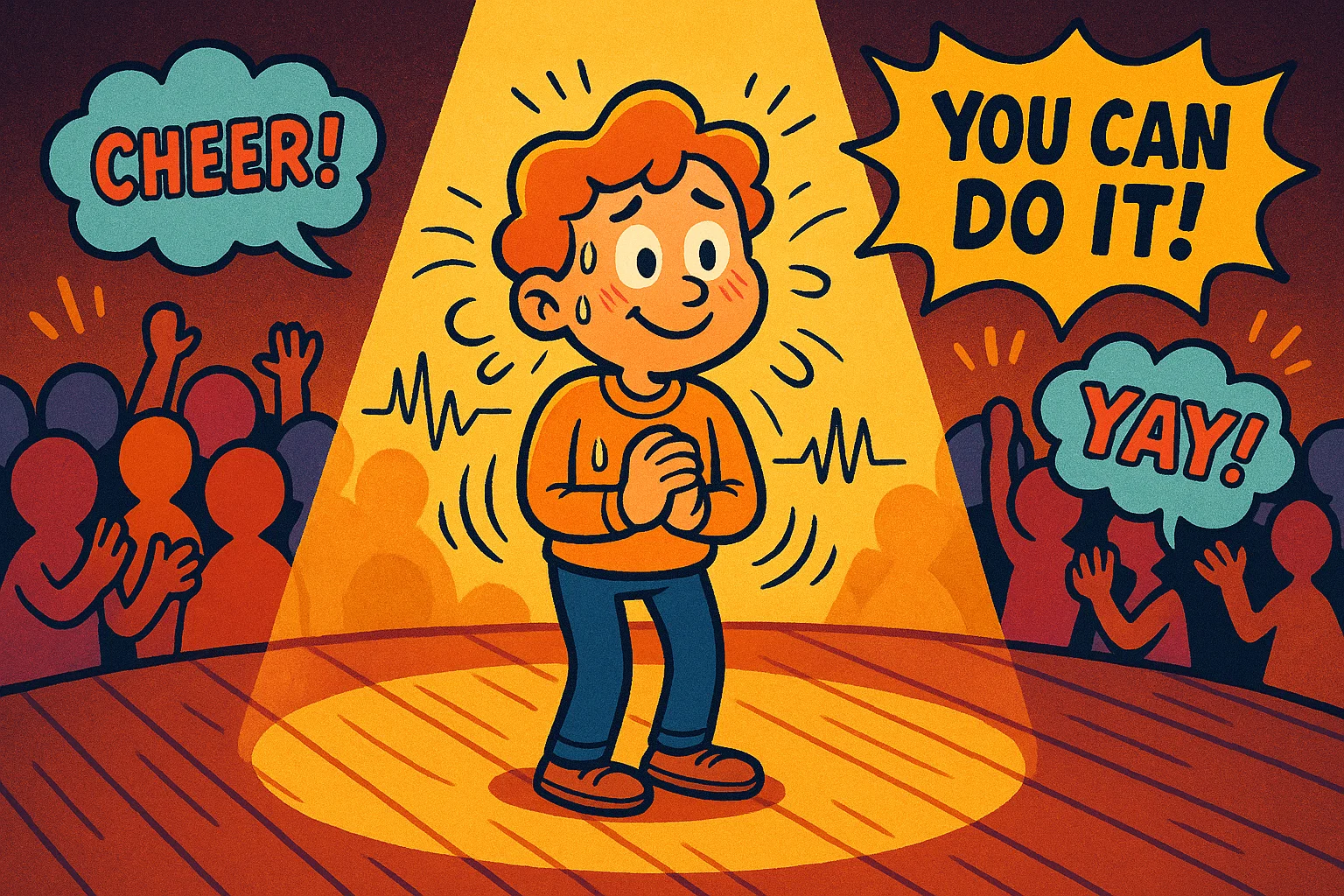
Stepping onto a stage whether for a performance, presentation, or classroom talk can trigger a powerful wave of fear for many people. This isn’t just mild nervousness; for some, it’s a debilitating form of performance anxiety, commonly known as stage fright. It can paralyze even the most prepared person, disrupting memory, voice, and focus at the worst possible moment. The emotional cost, shame, self-doubt, and lost opportunities can be profound.
The good news is that stage fright can be overcome. It’s a learnable skill rooted in understanding the causes of fear and using evidence-based strategies to calm your nervous system. Research shows that mastering performance skills and managing anxiety in a supportive environment can unlock remarkable potential. This guide breaks down the psychology and physiology behind stage fright and offers practical, science-backed techniques to help you step into the spotlight with confidence.
What Is Stage Fear?
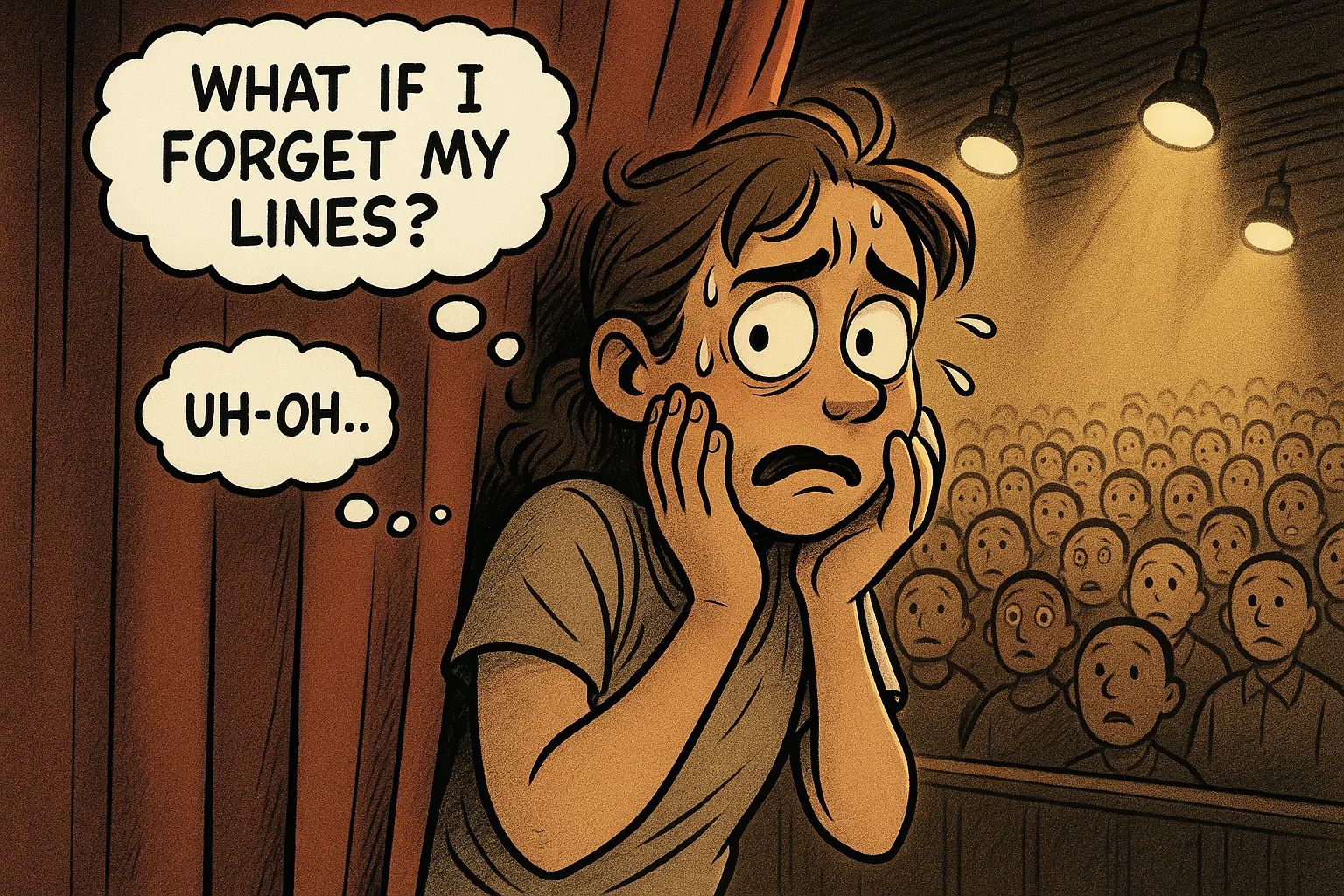
Stage fear, or performance anxiety, is a specific form of social anxiety that manifests in individuals facing an audience or evaluation. It goes far beyond the typical pre-performance jitters. Psychologically, it is defined by excessive, persistent, and irrational worry about public speaking or performing, often involving the anticipation of humiliation or embarrassment.
For singers, students facing an oral exam, business professionals delivering a presentation, or actors, this fear of public speaking or performing can lead to complete mental blockages. It is a highly situational phobia that can significantly impact a person’s life, career, and personal growth.
Key Signs of Stage Fear
The symptoms of stage fright are a clear signal of your body’s stress response kicking into overdrive. While everyone experiences different intensity, here are common indicators that you are experiencing stage fright:
Physical Symptoms:
- Rapid heart rate (tachycardia) and elevated blood pressure.
- Shallow or rapid breathing (hyperventilation).
- Trembling voice, shaky hands, or wobbly legs.
- Excessive sweating (hyperhidrosis) or flushing.
- Dry mouth, often referred to as “cotton mouth.”
- Nausea, upset stomach, or sudden need to use the bathroom.
Cognitive and Emotional Symptoms:
- Memory blocks or ‘blanking out’ on material (with constant worry about making mistakes).
- Intense self-criticism and negative thoughts.
- Difficulty focusing or concentrating on the task at hand.
- An intense desire to flee the situation (wanting to escape stage fright itself).
How Stage Fear Differs from General Anxiety
While all stage fear is a form of anxiety, it is distinctly situational. General anxiety is a pervasive, ongoing state of worry about various aspects of life. Stage fear, however, is a specific social phobia or social anxiety disorder that is triggered precisely by the act of getting up in front of others or the perceived evaluation.
The key difference lies in the trigger: Stage fear only surfaces when an individual is about to go on stage or perform in front of an audience, or even when simply thinking about it. While chronic stage fright may be linked to a broader social anxiety disorder (SAD), in many cases, it is an isolated, performance-specific issue.
How the Body Reacts During Stage Fear
The moment you step on stage and face the crowd, your brain misinterprets the situation as a threat like being chased by a predator. This triggers the primitive “fight-or-flight” mechanism, mediated by the sympathetic nervous system.
- Adrenaline Rush: The body releases stress hormones like adrenaline and cortisol.
- Physical Preparation: Adrenaline prepares the body for action, which causes the heart to pump faster, sending more oxygenated blood to the muscles (leading to shaking).
- Digestive Halt: Blood flow is diverted from non-essential functions, like digestion, causing that common “sick” feeling in the stomach.
- Cognitive Impact: High cortisol levels can temporarily impair the prefrontal cortex, the part of the brain responsible for working memory and retrieval, leading to mental “blanks.”
Learning to calm your nervous system is essential for regaining control in high-stress moments.
Main Causes of Stage Fear
Understanding the root causes of stage fear is the crucial first step in overcoming it. The causes of stage fright are often a complex interplay of personal history, mindset, and biological predisposition.
Fear of Judgment and Criticism
For many, the core of performance anxiety is the deep-seated fear of making a mistake in front of a group. This fear is often fueled by perfectionism. The internal dialogue can be relentless: “If I mess up, everyone will think I’m incompetent.” This desire to prove yourself to others sets an impossibly high standard, and the gap between the perfect ideal and the inevitable human imperfection is what causes stage fright. The fear is less about the performance itself and more about the perceived negative evaluation from the audience.
Lack of Preparation or Experience
Insufficient preparation is a massive contributor. When you know your material well, your confidence is rooted in competence. Conversely, going into a performance unprepared is a guaranteed anxiety trigger. Furthermore, lack of experience especially in highly visible settings means the situation is unfamiliar, which the brain perceives as a potential threat. Regular exposure and dedicated practice are key to building comfort.
Past Negative Experiences
A single deeply embarrassing moment while performing or speaking or performing in the past can condition a fear response. If someone forgot their lines, was laughed at, or failed an exam, that memory can reinforce the belief that public performance is inherently dangerous or humiliating. These memories create an automatic, fear-based expectation for future events.
Biological and Mental Health Factors
While stage fright isn’t always a sign of a disorder, certain biological factors can increase susceptibility.
- Temperament: Individuals with naturally shy, inhibited, or anxious temperaments may be more prone to developing stage fear.
- Genetics: Research suggests a genetic component to anxiety disorders, meaning a family history of anxiety may predispose an individual to experience stage fright more acutely.
- Underlying Conditions: In some cases, chronic stage fear is a manifestation of a broader social anxiety disorder. If the fear is persistent and disabling across many social situations, it may indicate a need for professional evaluation.
Psychological Techniques to Overcome Stage Fear
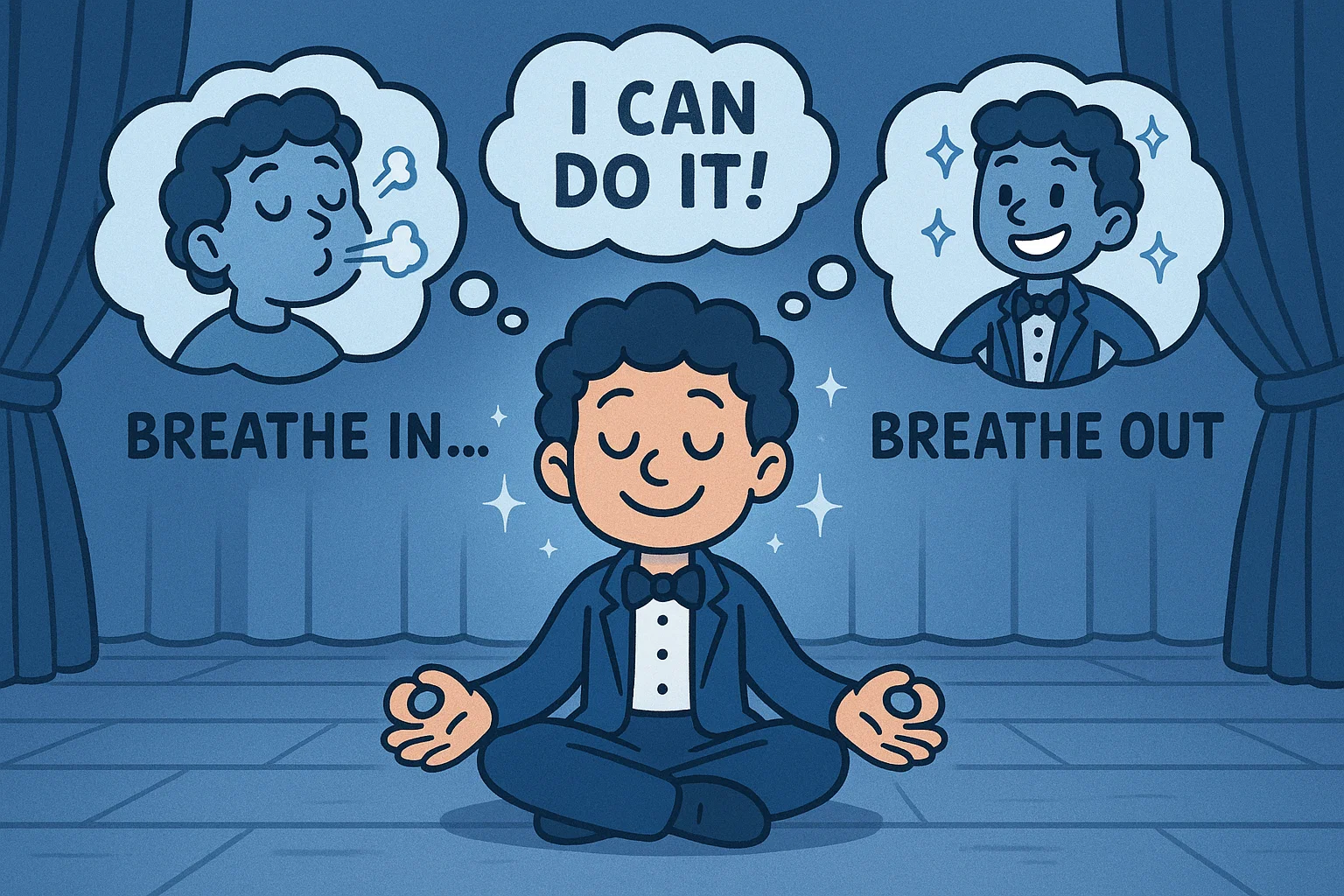
The most effective ways to overcome performance anxiety start in the mind. These psychological strategies help train your brain to recognize that there’s no immediate danger and to manage the fight-or-flight response.
Deep Breathing and Relaxation Methods
Using deep breathing techniques is one of the fastest ways to calm your nerves because it directly intervenes with the autonomic nervous system, signaling to the brain that the threat has passed.
| Technique | Description | Benefit |
| Diaphragmatic Breathing | Place one hand on the chest and one on the belly. Breathe in slowly through the nose, making sure only the belly rises. Exhale slowly through pursed lips. | Activates the parasympathetic nervous system, helping to reduce anxiety. |
| 4-7-8 Technique | Inhale silently through the nose for a count of 4. Hold the breath for a count of 7. Exhale completely through the mouth with a whoosh sound for a count of 8. Repeat 3-4 times. | Highly effective for quickly slowing your heart rate and inducing calm. |
Visualization of Success
Visualization is a powerful cognitive tool. By taking a moment to close your eyes and imagine yourself delivering your lines or singing perfectly, you begin to reprogram your brain’s anticipation from fear to positive expectation. Repeatedly visualize the entire sequence: stepping on stage, feeling confident, connecting with your audience, successfully delivering your message, and receiving applause. This practice builds positive neural pathways.
Positive Affirmations and Mindset Shifts
Replace negative thoughts like “I’m going to fail” with empowering, realistic affirmations. This process of replacing negative thoughts with positive ones is a cornerstone of cognitive techniques.
Examples of helpful mantras:
- “I am prepared, and I am here to share my knowledge.”
- “This audience wants me to succeed.”
- “My feelings of anxiety are just energy I can channel this.”
Mindfulness and Meditation
Regular meditation practice helps you learn to observe your thoughts and feelings, including the onset of anxiety, without immediately reacting to them. Mindfulness teaches you to stay present in the moment rather than being lost in worried thoughts about what might go wrong or regret about the past. This practice can significantly reduce chronic anticipatory stress those familiar pre-show jitters.
Reframing Fear as Excitement
Both fear and excitement share the same physiological responses (increased heart rate, adrenaline). Instead of trying to suppress the feelings, try to interpret them differently. Tell yourself, “My body is feeling energized and ready to perform,” rather than “I am scared.” Research suggests this technique helps you effectively channel the high arousal into constructive energy for your performance.
Physical Preparation and Body Control
Physical readiness is an underestimated element in learning to manage stage fright. A controlled body sends signals of safety and competence back to the brain.
Regular Exercise and Posture Training
Physical activity, such as yoga, stretching, or light aerobic exercise, releases endorphins and reduces background stress. Focusing on confident posture standing tall, shoulders back can subtly convince your brain that there’s no threat, as confident body language is instinctively associated with safety.
Breathing Coordination During Speech or Performance
Many amateur public speakers neglect the role of breath control in sustaining performance. Incorporate breathing exercises into your material practice. For singers and speakers, learning to pause naturally and take a deep, controlled breath before a difficult line or high note ensures consistent volume and reduces the risk of vocal strain, which in turn reduces the anxiety of voice cracking or running out of air.
Grounding and Body Awareness
When anxiety spikes, an immediate grounding technique can help you quickly re-establish control.
- Feel Your Feet: Focus on the sensation of your feet pressing into the floor. Wiggle your toes inside your shoes. This simple act brings you out of your head and into the physical reality of the space.
- The 5-4-3-2-1 Method: Quickly identify 5 things you can see, 4 things you can feel, 3 things you can hear, 2 things you can smell, and 1 thing you can taste. This is an excellent way to interrupt the anxious thought spiral.
Warm-Up Rituals Before Performance
A consistent pre-show ritual gives you a sense of control and helps you transition into a focused state. This might be a short breathing sequence, a few light stretches, or vocal exercises.
| Time | Activity | Goal |
| 30-45 min out | Light stretching, brisk walk | Release physical tension and excess energy. |
| 15 min out | Vocal or physical warm-ups, deep breaths | Tune the instrument and focus on the task. |
| 5 min out | Visualization, anchor mantra | Center your mind and calm your nerves. |
Practical Tips to Get Rid of Stage Fear
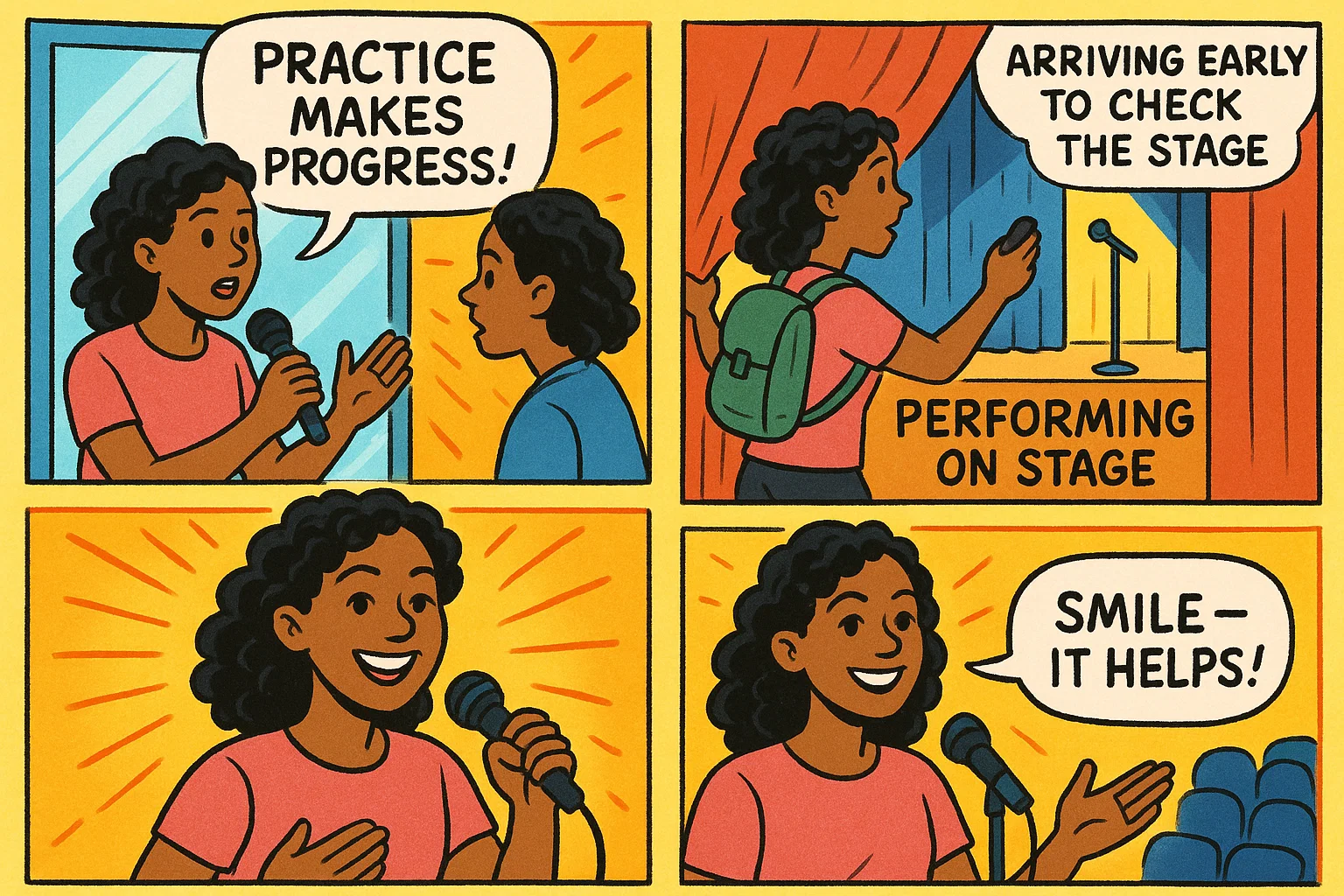
These steps combine preparation with stage-day strategies to help you effectively get over stage fright and deliver a strong performance.
Prepare Thoroughly and Practice Repeatedly
There is no substitute for preparation. When you know your material so well that you could recite it in your sleep, your brain has a safety net. Practice is not just repetition; it’s about perfecting your public speaking skills and practicing the transition between sections. The goal is to make the performance feel automatic, minimizing the chance of an error-induced panic.
Start Small and Gradually Increase Exposure
If the idea of performing in public is terrifying, don’t begin with a high-stakes, large-audience event. EGradual exposure is highly effective:
- Start by practicing in front of a mirror.
- Move to practicing in front of others (one or two supportive friends).
- Progress to a small, informal gathering.
- Finally, tackle a larger, public forum.
This controlled, incremental exposure helps you normalize the experience and gain more confidence.
Arrive Early and Adapt to the Environment
Familiarity reduces anxiety. Arriving early allows you to explore the stage, test the sound and lighting, walk around, and settle into the space. This makes the environment less foreign and threatening when you finally go on stage. Connect with your audience by greeting early arrivals if appropriate.
Connect with the Audience
Many people view the audience as a panel of stern judges. Shift the focus from your internal fear to your external message. Look for friendly faces and make genuine eye contact. Smiling and a momentary pause to acknowledge the room can establish a human connection, reducing the feeling of isolation and reminding you that people in the audience are just people.
Seek Constructive Feedback
Instead of seeing mistakes as proof of failure, view them as data points for improvement. Work with a coach or a trusted mentor and ask for specific, constructive feedback. Learning to accept and apply feedback helps you hone your skills and transforms the fear of judgment into a commitment to growth.
Record and Review Performances
Video-recording yourself and reviewing it can feel awkward initially, but it’s a powerful tool. It helps you see your performance objectively, identifying both strengths and areas for improvement. Over time, you become desensitized to seeing yourself, reducing the self-conscious anxiety that often accompanies getting up in front of others.
Long-Term Confidence Building
Sustainable confidence is built on habit, practice, and self-compassion.
Regular Exposure to Performance Settings
Normalizing performance is key. Join a local public speaking club like Toastmasters, a community choir, or a drama class. Making performance a regular, low-stakes part of your routine dramatically reduces the anticipatory anxiety surrounding a one-off event.
Building a Supportive Network
Surround yourself with people peers, mentors, and coaches who provide encouragement and constructive support. A strong network can help challenge your distorted fears and remind you of your strengths, helping you feel less alone in your struggle.
Tracking Progress Over Time
Keep a journal to record your performances. Note the anxiety level before, during, and after, along with what techniques worked and what you did well. This progress journal will be a concrete testament to how far you have come, preventing the common trap of forgetting past successes.
Combining Mental Health Support If Needed
For chronic or severe cases where stage fear is seriously impacting life choices (e.g., job performance, education), seeking professional mental health support is the smart and necessary step. Techniques like cognitive behavioral therapy (CBT) are highly effective in treating social anxiety and specific phobias by helping you reshape unhelpful thought patterns.
Stage Fear in Different Professions
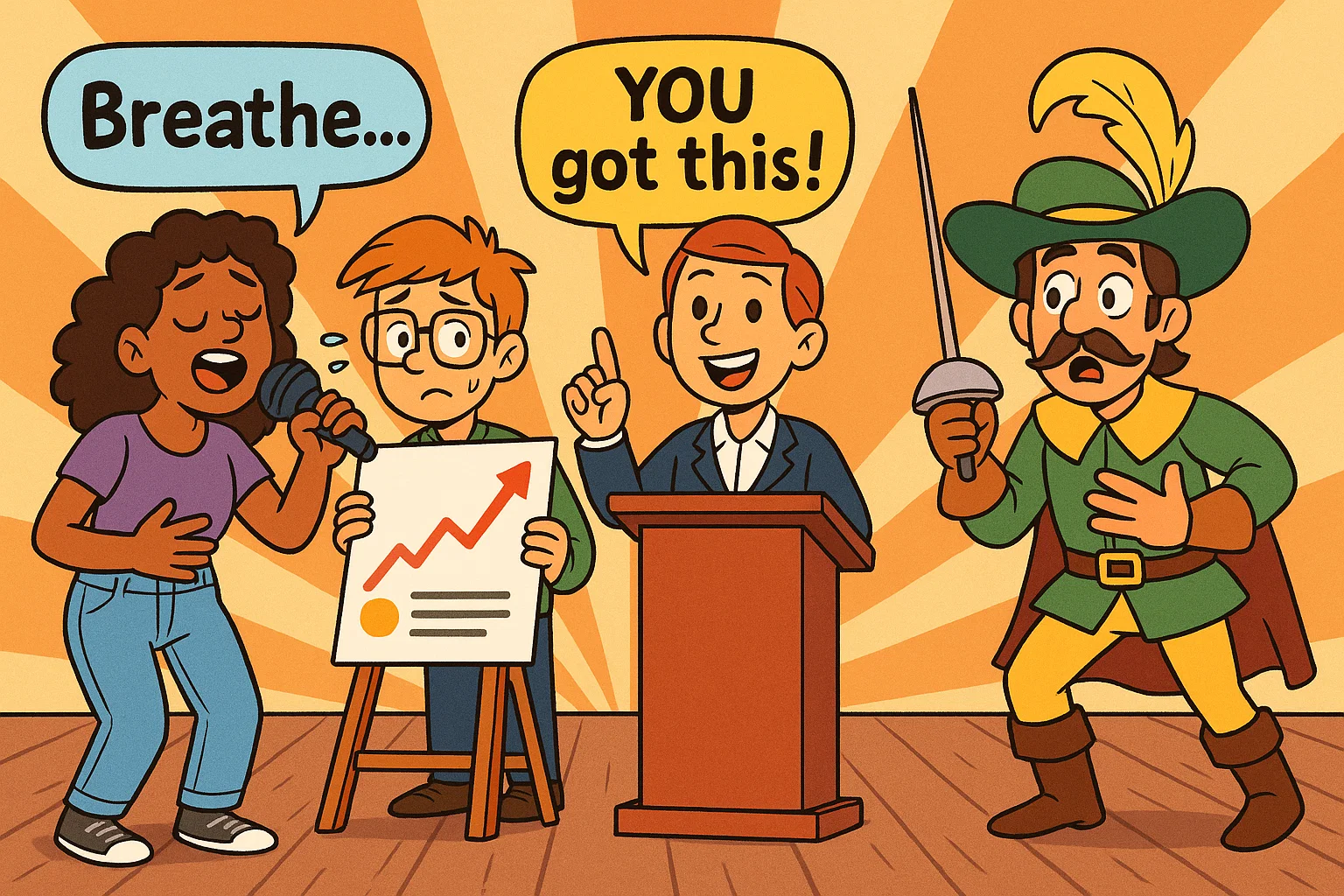
Stage fear, while sharing common roots, manifests differently based on the required skill set.
| Profession | Manifestation of Fear | Tailored Strategy |
| Students & Speakers | Forgetting points, voice trembling. | Memorize the first few lines perfectly; keep your attention on your material, not the audience. |
| Musicians & Actors | Motor/vocal control loss, missing cues. | Ritualistic warm-ups and over-rehearsing the physical aspects of the performance. |
| Professionals & Leaders | Inability to think quickly, lack of executive presence. | Practice Q&A sessions; use power poses before the event to boost confidence. |
Quick Exercises Before Going on Stage
When the adrenaline hits moments before you step on stage, these quick techniques can help calm your nerves.
Body Scan and Tension Release
Quickly scan your body from head to toe, noticing areas of tension (shoulders, jaw, hands). Consciously clench those muscles tightly for five seconds, then release. This physical action signals a return to control.
Power Poses and Confidence Gestures
Stand tall with your hands on your hips (the “Wonder Woman” or “Superman” pose) for two minutes. Research by Amy Cuddy suggests that these “power poses” can temporarily increase testosterone (linked to confidence) and decrease cortisol (linked to stress), helping to make you feel like a more authoritative presence.
Short Breathing Sequences
A minute of controlled 4-7-8 breathing (see table above) is the ultimate anxiety circuit breaker. Do this backstage or even just before you begin your performance.
Anchor Phrases or Mantras
Have one simple, pre-determined phrase ready to repeat to yourself right before you begin: “I am here to serve,” “Stay calm and clear,” or simply, “I’ve got this.” This refocuses your mind instantly.
When to Seek Professional Help
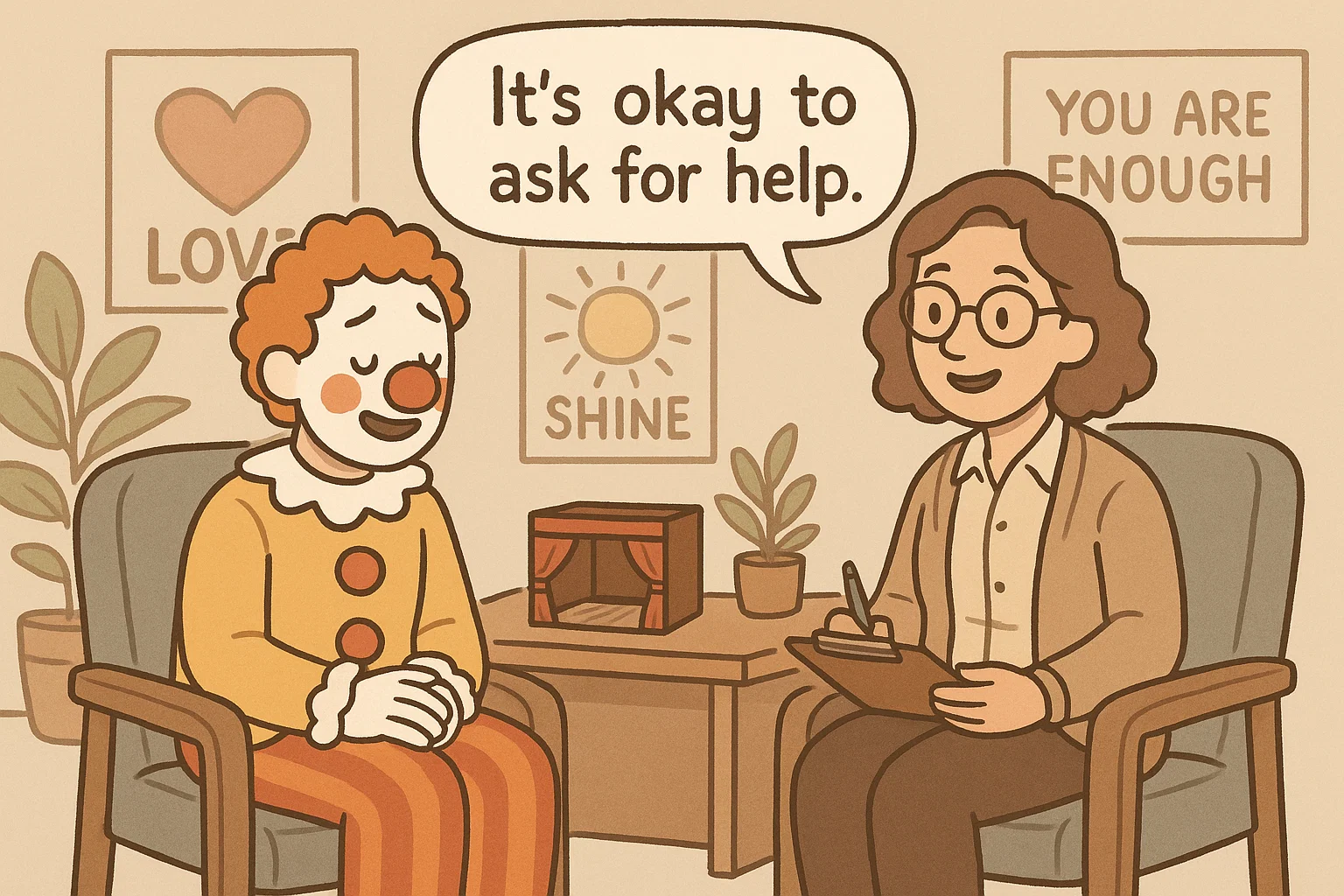
While these techniques can help you overcome mild to moderate stage fright, there are times when professional intervention is warranted.
Signs that Fear is Impacting Daily Life
If your fear of public speaking or performance has led to:
- Regular avoidance of career-advancing opportunities.
- Experiencing panic attacks or extreme physical distress during performances.
- Significant impact on academic performance (e.g., failing oral exams).
These signs suggest the fear is moving beyond simple nervousness into a clinical anxiety issue.
Role of Therapy and Counseling
A therapist can offer targeted support:
- Cognitive-Behavioral Therapy (CBT): Highly effective in challenging and changing the irrational negative thoughts that fuel performance anxiety.
- Exposure Therapy: Systematically and safely exposes you to the performance situation to desensitize the fear response.
- Performance Coaching: Specifically helps public speakers and performers refine performance skills and build stage resilience.
FAQs About Stage Fear
Can stage fear be completely eliminated?
While you can significantly reduce anxiety and manage it effectively, a complete elimination is unlikely, and perhaps undesirable. A small amount of nervous energy is a natural performance enhancer. The goal is to manage it so it works for you, not against you.
How long does stage fear last?
The duration of stage fear is highly variable. Acute symptoms typically peak just before and at the start of a performance, often subsiding after the first few minutes as you connect with your audience and get into your flow. However, chronic anticipatory anxiety can begin weeks beforehand. Consistent practice and use of techniques like deep breathing can shorten this duration dramatically.
What are the fastest ways to calm down before going on stage?
- Deep Diaphragmatic Breathing: 3-5 rounds of 4-7-8 breathing.
- Power Posing: 2 minutes of standing in an expansive, confident posture.
- Grounding: Focus on the sensation of your feet on the ground.
How does breathing help reduce anxiety?
Controlled deep breaths activate the vagus nerve, which runs from the brainstem to the abdomen. This activation sends a signal to your brain to switch from the sympathetic (“fight-or-flight”) to the parasympathetic (“rest-and-digest”) nervous system, helping to calm your nervous system and slow your heart rate.
Is stage fear common among professionals?
Yes. The American Psychiatric Association recognizes performance anxiety as one of the most common forms of social anxiety. Even highly seasoned professionals and world-famous public figures, actors, musicians, and politicians still report experiencing stage fright. The difference is that they have developed powerful strategies to manage the physical and mental symptoms, allowing them to transform that nervous energy into peak performance.

